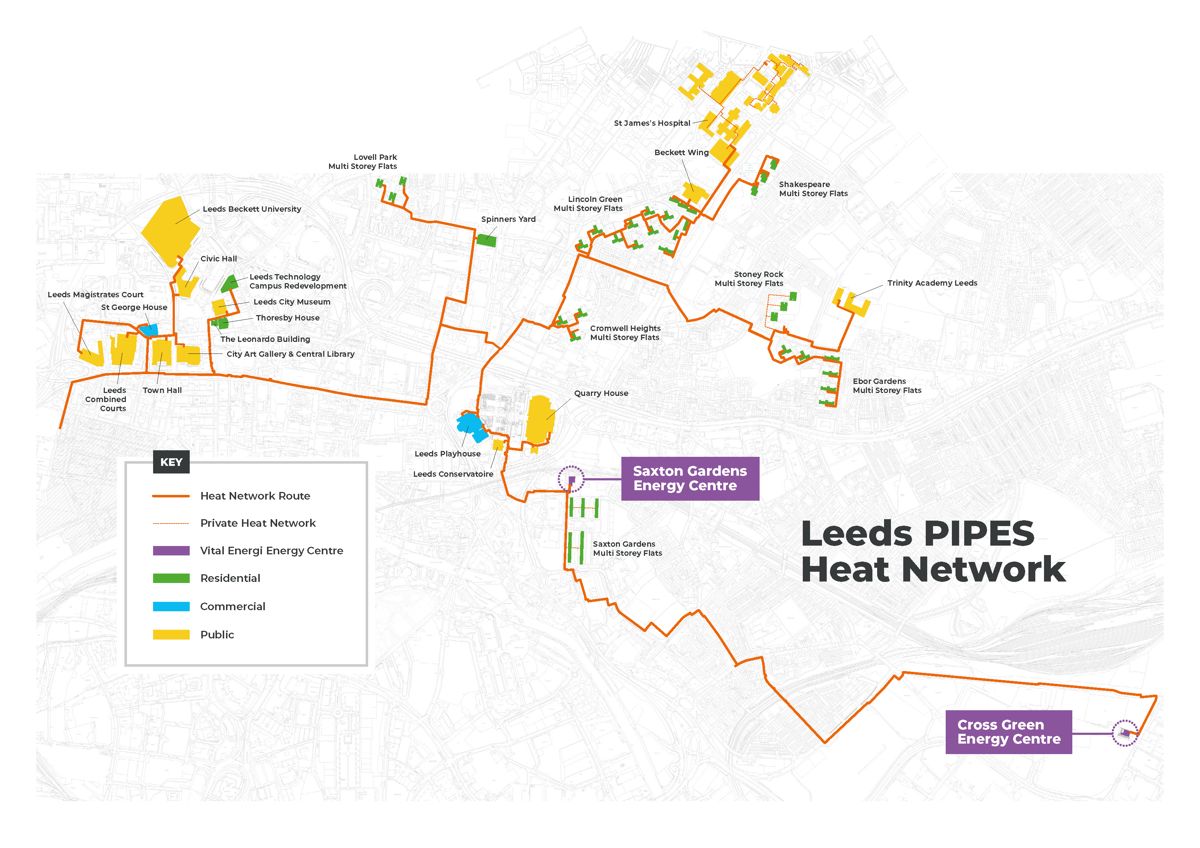The Leeds PIPES district heating network is expanding its green energy reach with a £24.5m investment, aiming to provide low carbon heating to the South Bank area and serve 8,000 residents through connections to 28 buildings. This initiative is a crucial step toward Leeds’s ambitious goal of becoming the UK’s first net-zero city, transforming waste into a sustainable energy source.
What is the Leeds PIPES district heating network and how is it expanding?
Leeds PIPES district heating network, using energy from non-recyclable waste, provides low carbon heating to the city. With a £24.5m investment, it’s expanding to cover South Bank, connecting 28 buildings and serving 8,000 residents. This growth aligns with Leeds’s goal to become the UK’s first net-zero city.
Introduction to Leeds PIPES District Heating Network
Leeds PIPES, an innovative district heating network, recently secured a significant investment to expand its services to a broader community within the city. The £24.5m funding boost is set to propel the Leeds’s South Bank area into a more sustainable future, offering residents access to a low carbon and cost-effective heating solution. The expansion plan encompasses connections to an estimated 28 buildings, providing up to 8,000 residents and mixed-use customers with reliable heat sourced from the city’s non-recyclable domestic waste.
The Leeds PIPES district heating network has been pivotal in transforming how the city approaches energy consumption and waste management. It has emerged as a symbol of urban sustainability, using advanced technology to convert waste into a valuable resource for the community. By harnessing the energy produced from non-recyclable waste, the project delivers warmth and hot water to numerous buildings, marking a departure from traditional, fossil-fuel reliant heating systems.
Since its inception, the project has not only supplied heat to over 1,900 homes and various non-domestic buildings but also substantially cut carbon emissions. In the previous year alone, the network achieved a reduction of 5,945 tonnes of carbon, significantly contributing to Leeds’s environmental targets.
Ongoing Developments and Strategic Collaborations
The latest funding is expected to accelerate Leeds’s transition to a low carbon city, aligning with the City Council’s objective to mitigate climate change impacts. Earlier this year, the network made considerable strides by integrating over two hundred and fifty council properties within Lovell Park Heights, Lovell Park Grange, and Lovell Park Towers into its system. These residences now benefit from a consistent supply of heat from the network, underscoring the project’s commitment to enhancing the city’s energy infrastructure.
This year’s significant milestones also include the successful connection of Leeds Conservatoire and the former Technology Campus Student Residential development to the Leeds PIPES network. Both institutions now enjoy the network’s sustainable heating, demonstrating the expansive nature of the project. Furthermore, over the summer, several promising agreements were signed, promising to broaden the network’s reach. Notable among these is the new Railway Street affordable homes scheme and the student apartments at 24-28 Great George Street, which will also witness the return of the Victoria Hotel pub.
The initiative extends to prominent educational institutions as well, with Leeds College of Building’s North Street Campus and the Co-op Academy Brierley SEND School in Cross Green agreeing to join the network. These partnerships illustrate a community-wide effort to support Leeds’s progression towards a carbon-neutral reality.
Leadership Perspectives on the Expansion
The expansion of the Leeds PIPES network has received commendation from key city council members. Councillor Mohammed Rafique, Leeds City Council’s executive member for climate, energy, environment and green space, along with Councillor Jessica Lennox, executive member for housing, expressed their joint satisfaction with the project’s growth.
“We are both pleased that many more residents will soon be paying significantly less to heat their homes thanks to this latest expansion of the Leeds PIPES network,” they stated. Highlighting the urgency of the issue, they remarked, “UK’s homes are some of the least efficient and most reliant on costly fossil fuel gas in Europe, and too many families in our city struggle to pay their energy bills. We are committed to helping households by making our homes greener and fit for the future.”
Their vision for Leeds is ambitious, with a goal to position it as the UK’s first net-zero city. The expanded reach of the Leeds PIPES network is a critical step towards that milestone, promising not only environmental benefits but also enhanced economic stability for families within the city.
Leeds PIPES – Leeds City Council’s dedicated page on the district heating network.
Councillor Mohammed Rafique – Profile
Councillor Jessica Lennox – Profile
Leeds College of Building – Official Website
Co-op Academy Brierley – Official Website
- The Leeds PIPES district heating network is undergoing a £24.5m expansion to provide low carbon heating to the South Bank area, connecting 28 buildings and serving 8,000 residents.
- The project utilizes energy from non-recyclable waste, transforming it into a sustainable heating source and significantly reducing carbon emissions.
- Since its inception, Leeds PIPES has supplied heat to over 1,900 homes and non-domestic buildings, achieving a carbon reduction of 5,945 tonnes in the past year.
- Recent strategic collaborations have integrated numerous council properties and educational institutions into the network, enhancing the city’s energy infrastructure.
- City council members express satisfaction with the expansion, emphasizing its potential to lower heating costs and support Leeds’s ambition to become the UK’s first net-zero city.
